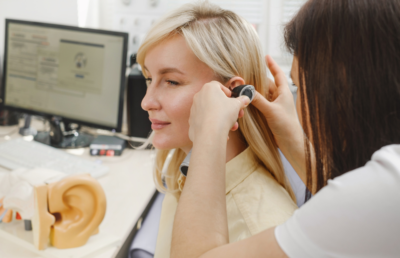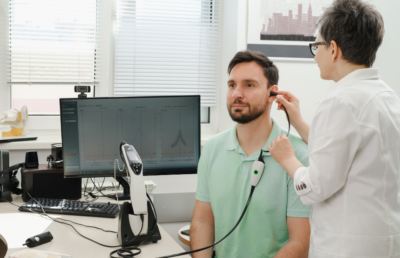Hearing loss can negatively impact our connection to the world. It interferes with our ability to communicate, appreciate music, and enjoy the sounds of nature. While hearing loss is commonly attributed to aging alone, it is important to recognize other age-related health conditions that can impact hearing.
Understanding which age-related health conditions can lead to or increase the risk of hearing loss can help us uncover ways to manage the situation and even take steps to reduce the impact.
Age-Related Health Conditions That Impact Hearing Loss
Aging can lead to many health conditions, and it is important to understand these conditions so you can receive proper medical attention and reduce their impact on other things like your hearing health.
Presbycusis: Gradual Age-Related Hearing Loss
Presbycusis is the most common type of hearing loss associated with aging. It occurs gradually over time as the delicate structures in the inner ear naturally wear down. While it can affect individuals differently, presbycusis often manifests as difficulty hearing high-pitched sounds and understanding speech, especially in noisy environments.
However, it is essential to remember that presbycusis is not an inevitable consequence of aging, and treatment options are available, including assistive devices, hearing aids.
Cardiovascular Disease and Hearing Health
Cardiovascular disease, including conditions like hypertension and atherosclerosis, can impact hearing health. The inner ear relies on a healthy blood supply to function optimally. If the blood vessels in the ear become damaged or restricted due to cardiovascular issues, it can lead to hearing loss or tinnitus (ringing in the ears).
By managing cardiovascular health through lifestyle changes and appropriate medical interventions, we can mitigate the risk of hearing impairment.
Diabetes and Hearing Loss
Diabetes, a chronic condition characterized by high blood sugar levels, can increase the risk of developing hearing loss. Elevated blood sugar levels can damage the blood vessels and nerves in the inner ear, leading to sensorineural hearing loss.
Taking care of your diabetes and keeping blood sugar levels within the normal range can reduce hearing damage and maintain healthy hearing abilities.
Ototoxic Medications and Their Impact on Hearing
Some medications, known as ototoxic drugs, have the potential to cause hearing loss as a side effect. These medications may include certain antibiotics, chemotherapy drugs, and nonsteroidal anti-inflammatory drugs (NSAIDs).
If you are taking any medications and notice changes in your hearing, it is crucial to consult with your healthcare provider. They can evaluate the potential risks and discuss alternative options, if necessary, to protect your hearing health.
Seeking Help: Visit an Audiologist
If you or a loved one is experiencing hearing loss, seeking professional help from an audiologist is essential. Audiologists are highly trained professionals specializing in diagnosing and treating hearing loss and related conditions. They possess the expertise and resources to conduct comprehensive hearing evaluations, determine the extent of hearing loss, and recommend appropriate interventions.
Audiologists offer a range of solutions, including hearing aids, assistive listening devices, and communication strategies tailored to individual needs. By working with an audiologist, you can receive personalized care and regain your ability to actively engage in conversations, enjoy your favorite activities, and reconnect with the world of sound.
While hearing loss is not reversible, it is treatable. With the help of an audiologist, it can be managed through comprehensive evaluations, comprehensive hearing tests, and expert fitting of assistive devices.
Embrace Your Hearing Health With Chicago Hearing Services
Remember, hearing loss is not an unavoidable consequence of aging. By understanding the age-related health conditions that impact hearing, we can take proactive steps to address them.
If you are worried about your hearing, booking an appointment with an audiologist is the first step you should take. By taking this action, you can improve your hearing health.
Don’t let hearing loss hinder your ability to live life to the fullest. Schedule a consultation with a qualified Doctor of Audiology today and embark on a journey towards improved hearing and enhanced quality of life.
At Chicago Hearing Services, we are committed to providing top-quality care and support for your hearing needs. Our team of experienced audiologists understands the unique challenges associated with age-related hearing loss, and we are dedicated to helping you regain your ability to hear and communicate effectively. With state-of-the-art technology and a patient-centered approach, we strive to find the best solutions for your individual situation.
During your consultation, our audiologists will thoroughly evaluate your hearing and discuss your concerns and lifestyle requirements. We will work closely with you to develop a personalized treatment plan that may include hearing aids, assistive listening devices, or other appropriate interventions.
Our goal is to optimize your hearing abilities and enhance your overall well-being.
Take the proactive step today and schedule a consultation.





